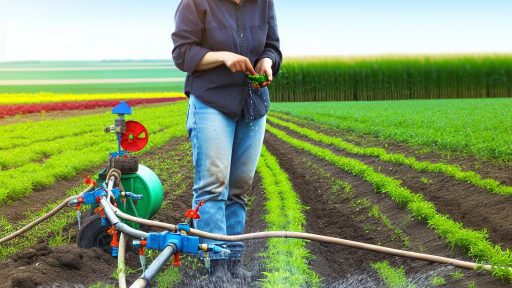Introduction to Agricultural Land Valuation and its Importance
Agricultural land valuation plays a vital role in the agricultural sector.
This process assesses the worth of land used for farming.
Land valuation is crucial for several stakeholders.
Farmers rely on accurate valuations for securing loans.
Investors use these valuations to assess potential returns.
Additionally, policymakers need this information for planning purposes.
The accuracy of land valuation affects market stability.
Moreover, it influences the overall agricultural economy.
Sustainable practices increasingly impact land valuation.
These practices reflect the increasing importance of environmental health.
They can enhance land productivity over time.
Furthermore, they may improve soil quality and biodiversity.
As a result, land with sustainable practices may receive a higher valuation.
This shift in perspective enhances the importance of sustainable farming.
Consequently, stakeholders must consider sustainability in their decisions.
Transform Your Agribusiness
Unlock your farm's potential with expert advice tailored to your needs. Get actionable steps that drive real results.
Get StartedOverall, agricultural land valuation is essential for informed decision-making.
Incorporating sustainable practices into this process brings long-term benefits.
It aligns the agricultural sector with modern environmental standards.
Definition of Sustainable Practices in Agriculture
Introduction to Sustainable Agriculture
Sustainable agriculture focuses on producing food efficiently and responsibly.
It aims to meet current needs without compromising future generations.
This approach integrates environmental health, economic profitability, and social equity.
Key Principles of Sustainable Practices
One fundamental principle is the conservation of natural resources.
Farmers implement practices that protect soil, water, and biodiversity.
Additionally, they minimize chemical use and promote organic farming techniques.
Methods Used in Sustainable Agriculture
- Crop rotation improves soil health and reduces pest issues.
- Cover cropping protects soil and enhances nutrient content.
- Integrated pest management reduces chemical reliance.
Each method contributes to ecological balance.
Furthermore, these practices help local ecosystems thrive.
Benefits of Sustainable Agriculture
Sustainable practices lead to healthier ecosystems.
They also promote improved food quality and safety.
Moreover, sustainable agriculture supports rural communities and economies.
The Role of Technology
Innovative technology enhances sustainable farming efficiency.
Farmers utilize precision agriculture to optimize resource use.
This technology allows for targeted applications of water and nutrients.
The Economic Benefits of Sustainable Agricultural Practices
Enhancing Soil Health
Sustainable agricultural practices significantly enhance soil health.
Healthy soil leads to improved crop yields.
Consequently, farmers enjoy higher profits from their harvests.
Moreover, improved soil health reduces the need for chemical fertilizers.
This reduction minimizes overall production costs.
Boosting Market Demand
There is an increasing consumer demand for sustainably produced food.
Farmers adopting sustainable practices can tap into premium markets.
Showcase Your Farming Business
Publish your professional farming services profile on our blog for a one-time fee of $200 and reach a dedicated audience of farmers and agribusiness owners.
Publish Your ProfileThese markets often offer higher prices for organic and sustainably sourced products.
As a result, farmers enhance their revenue streams.
Energy Cost Savings
Implementing sustainable practices often reduces energy consumption.
Farmers can utilize renewable energy sources such as solar or wind.
These alternatives help stabilize energy costs over time.
Consequently, lower energy costs translate into increased net profits.
Access to Financial Incentives
Many governments offer financial incentives for sustainable farming practices.
Farmers may benefit from grants, tax breaks, and subsidies.
These financial supports encourage the adoption of sustainable methods.
Ultimately, they contribute to improved land valuation.
Resilience Against Market Fluctuations
Sustainable practices can enhance resilience against market fluctuations.
Diverse cropping systems reduce the risks associated with monoculture.
This diversity can safeguard farmers from crop failures due to pests or diseases.
As a result, sustainable farms tend to maintain more stable incomes.
Explore Further: The Role of Regenerative Farming in Long-Term Land Investment Returns
How Sustainable Practices Impact Soil Health and Productivity
Enhancing Soil Structure
Sustainable practices significantly enhance soil structure.
Methods like cover cropping and no-till farming improve soil aeration.
As a result, these methods reduce compaction and enhance water infiltration.
Healthy soil structure also facilitates root development.
Increasing Nutrient Availability
Organic farming introduces natural fertilizers, enriching soils with nutrients.
This practice increases the availability of essential minerals.
Crop rotation enhances nutrient cycling in the soil.
Consequently, farmers produce healthier crops with superior yields.
Promoting Biodiversity
Sustainability encourages a diverse range of soil organisms.
Microorganisms and earthworms contribute to soil health.
More biodiversity leads to better pest management and disease resistance.
It creates a more resilient agricultural system overall.
Improving Soil Moisture Retention
Cover crops play a vital role in moisture retention.
They reduce evaporation and promote effective water utilization.
As a result, crops thrive during dry conditions.
This practice also mitigates the risk of drought.
Enhancing Carbon Sequestration
Sustainable practices help sequester carbon in the soil.
They reduce greenhouse gas emissions associated with agriculture.
Ultimately, this contributes to climate change mitigation.
Farmers can benefit from improved soil health as a bonus.
Boosting Economic Viability
Healthy soils lead to higher productivity, boosting farm profitability.
Reduced dependency on chemical fertilizers cuts operational costs.
Moreover, sustainable practices often attract premium markets.
As such, farmers can enjoy better financial returns.
Learn More: Soil Erosion Control Strategies for Waterfront and Hillside Properties
Showcase Your Farming Business
Publish your professional farming services profile on our blog for a one-time fee of $200 and reach a dedicated audience of farmers and agribusiness owners.
Publish Your ProfileThe Role of Environmental Regulations in Land Valuation
Introduction to Environmental Regulations
Environmental regulations significantly impact land valuation in agriculture.
They set standards that landowners must follow to protect natural resources.
Compliance ensures sustainable land use and enhances property values.
Types of Environmental Regulations
Multiple types of regulations affect agricultural land value.
Water quality regulations require landowners to manage runoff.
Soil conservation practices are essential under specific environmental laws.
Additionally, air quality regulations ensure compliance with emission standards.
Land use planning laws shape how landowners can develop their properties.
Water Quality Regulations
Water quality regulations protect waterways from contamination.
Farmers often need to implement practices that reduce fertilizer runoff.
Consequently, the valuation of land near water sources may increase.
Soil Conservation Practices
Soil conservation regulations promote practices like crop rotation and cover cropping.
These methods enhance soil health and agricultural productivity.
Thus, properties demonstrating compliance can achieve higher market values.
Impact of Emission Standards
Emission standards govern air quality in agricultural practices.
Compliance involves reducing emissions from equipment and waste management.
Landowners who meet these standards often see an increase in land value.
Long-term Benefits of Compliance
Investing in compliance with environmental regulations offers multiple benefits.
First, it helps maintain a healthy ecosystem that supports farming activities.
Second, properties in compliance often attract environmentally conscious buyers.
Additionally, compliance can provide access to government subsidies and grants.
Challenges Faced by Landowners
Despite benefits, landowners face challenges in adhering to regulations.
The cost of implementing necessary changes can be high.
Furthermore, regulations can be complex and change frequently.
Landowners may need expert consultation to navigate these laws effectively.
Environmental Regulations and Their Impact on Land Value
Understanding environmental regulations is crucial for land valuation.
These regulations influence not only compliance costs but also property values.
Ultimately, sustainable practices work hand-in-hand with efficient land management.
See Related Content: Drought Preparedness Plans for Farmland Investors and Property Owners
Case Studies: Successful Implementation of Sustainable Farming Methods
Innovative Techniques at Green Valley Farms
Green Valley Farms recently adopted crop rotation practices.
This technique improved soil fertility and reduced pest infestations.
The farm reported a 30% increase in yield within one year.
Farmers also implemented organic pest control methods.
This reduced chemical usage and enhanced local biodiversity.
Regenerative Agriculture at Blue Sky Ranch
Blue Sky Ranch focused on holistic grazing management.
This practice restored pasture health and enhanced carbon sequestration.
Moreover, the ranch observed increased livestock productivity.
By employing cover crops, they mitigated soil erosion effectively.
Consequently, local wildlife flourished in the restored habitats.
Community Engagement at Earthwise Farm
Earthwise Farm engaged local communities in its operations.
Showcase Your Farming Business
Publish your professional farming services profile on our blog for a one-time fee of $200 and reach a dedicated audience of farmers and agribusiness owners.
Publish Your ProfileThey introduced educational workshops on sustainable practices.
The workshops promoted awareness and understanding of organic farming.
Additionally, they began a farm-to-table initiative.
This strengthened local food systems and reduced transportation emissions.
Technological Advancements at Harvest Tech Solutions
Harvest Tech Solutions developed precision agriculture tools.
Their drones monitor crop health and optimize water usage.
Farmers using these tools reported significant resource savings.
Furthermore, the software provided real-time data for decision-making.
This approach increased overall efficiency and sustainability in farming.
Delve into the Subject: Key Soil Health Factors to Assess Before Buying Agricultural Land

Quantifying the Value of Sustainable Practices in Land Appraisal
Significance of Sustainable Practices
Sustainable practices enhance agricultural land’s productivity and longevity.
This approach improves soil quality and water management capabilities.
Additionally, such practices can raise land’s market value significantly.
Investors and farmers increasingly recognize this value.
Criteria for Valuation
Valuers consider multiple criteria when assessing sustainable practices.
Factors like soil health, biodiversity, and ecosystem services are crucial.
Moreover, water conservation methods and organic farming techniques play a key role.
Impact on Market Demand
There is a growing consumer preference for sustainably produced goods.
This trend drives demand for farmland that uses sustainable methods.
Consequently, land utilizing these practices often commands higher prices.
Case Studies and Examples
Numerous studies highlight the financial benefits of sustainable agriculture.
For instance, a farm in Iowa adopted cover cropping and saw increased yields.
Similarly, a California vineyard implemented water-efficient irrigation, boosting profits.
These examples demonstrate the tangible benefits of sustainability in farming.
Challenges in Valuation
Despite benefits, valuing sustainable practices poses challenges.
Many appraisers lack the expertise in sustainability metrics.
Additionally, standard valuation methods may not capture all benefits.
Therefore, stakeholders must advocate for better assessment frameworks.
Future Directions in Land Valuation
The future of agricultural land valuation will increasingly reflect sustainability efforts.
Developing clear guidelines for valuing sustainable practices is essential.
Furthermore, integrating technology can enhance data collection and analysis.
Ultimately, adopting sustainable practices will shape land market dynamics.
Challenges and Barriers to Integrating Sustainability into Land Valuation
Understanding Current Valuation Methods
Current land valuation methods often overlook sustainability factors.
This creates a barrier to integrating sustainable practices.
Traditional metrics focus primarily on financial returns.
Such metrics typically ignore ecological and social contributions.
Consequently, sustainable practices do not get adequate recognition.
Lack of Standardized Sustainability Metrics
The absence of standardized metrics complicates evaluation efforts.
Different stakeholders often use diverse criteria for sustainability.
This inconsistency hampers effective communication regarding value.
Showcase Your Farming Business
Publish your professional farming services profile on our blog for a one-time fee of $200 and reach a dedicated audience of farmers and agribusiness owners.
Publish Your ProfileMoreover, it creates confusion among landowners and investors.
The industry needs clear definitions and benchmarks for sustainability.
Economic Pressures and Short-Term Thinking
Economic pressures push landowners towards short-term gains.
This often leads them to neglect long-term sustainable practices.
Moreover, financial incentives often favor conventional farming methods.
Consequently, sustainable practices struggle to compete in the market.
These pressures create significant barriers to sustainable land valuation.
Knowledge Gaps Among Stakeholders
Many stakeholders lack training in sustainable practices.
This knowledge gap affects land valuation outcomes.
Farmers, valuers, and investors often miss critical insights.
Enhancing education and awareness can foster better evaluation.
Addressing these gaps is crucial for more effective sustainability integration.
Regulatory and Policy Challenges
Regulatory frameworks often lag behind sustainable innovations.
This leads to uncertainties for landowners who wish to integrate sustainability.
Moreover, inconsistent policies can undermine sustainable initiatives.
Landowners may face barriers to implementing new practices.
Streamlining regulations can support sustainable land valuation efforts.
Future Trends in Agricultural Valuation: Sustainability’s Influence
The Growing Importance of Sustainability
Sustainability is becoming a central focus in agricultural practices.
This shift significantly affects how land is valued.
Investors and buyers increasingly prefer sustainable farms.
As a result, sustainable practices can raise land prices.
Case Studies Demonstrating Value Enhancement
Several studies illustrate the value of sustainable farming.
For instance, Green Valley Farms adopted organic practices.
They saw a 20% increase in land value over five years.
Additionally, EcoAgri Solutions integrated renewable energy.
Their property value rose significantly due to lower operational costs.
Regulatory Incentives and Market Demand
Government policies increasingly support sustainable agriculture.
Many regions offer tax incentives for eco-friendly practices.
Furthermore, consumers are demanding more organic products.
This creates a favorable market environment for sustainable farms.
Technological Advancements in Sustainability
Technology plays a crucial role in sustainable agriculture.
Precision farming enhances crop yields while minimizing waste.
Moreover, smart irrigation systems conserve water effectively.
These innovations contribute positively to land valuation.
Consumer Awareness and Behavioral Changes
Consumers are becoming more aware of sustainability issues.
This awareness is influencing purchasing decisions.
Sustainable brands often enjoy enhanced loyalty and trust.
Consequently, land associated with these brands may see increased valuation.
The Role of Certifications in Valuation
Certifications can enhance marketability for agricultural lands.
Organic or sustainability certifications signal higher quality.
Showcase Your Farming Business
Publish your professional farming services profile on our blog for a one-time fee of $200 and reach a dedicated audience of farmers and agribusiness owners.
Publish Your ProfileThey can attract premium pricing from environmentally-conscious buyers.
Thus, acquiring relevant certifications can strategically increase land value.
Additional Resources
Inter-American Institute for Cooperation on Agriculture (IICA)
Environmental Impacts of Food Production – Our World in Data




